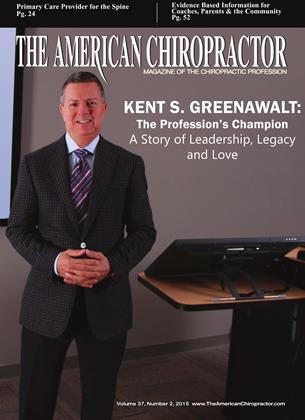The Chiropractic Profession: A Graduating Student Perspective
PERSPECTIVE
James Goetz
OVER FOUR YEARS AGO, LIKE SO MANY BEFORE ME, I BEGAN A VERY LONG JOURNEY THAT HAS POSITIVELY CHANGED MY LIFE FOR THE BETTER. As I TELL PROSPECTIVE STUDENTS INTERESTED IN HEALTH CARE, MY EXPERIENCE BECOMING A PHYSICIAN HAS MADE ME INTO A MAN. FOR THIS JOURNEY I WILL BE FOREVER GRATEFUL.
When one begins their schooling, there is an excitement due to the newness and sense of adventure. Most of our instructors aie at first, often seen as heroes and held up to such high standards. What they often say in class becomes words in which we live by. Over the years however, we uniquely evolve as students and individuals and are molded into the physicians we are to become.
As we advance through the program, we begin to forge our own opinions and ideas on the profession and how we might like to practice. Somehow, we gravitate to other classmates and doctors with the same mentality and hopefully help one another along the way.
As I sit here before I am to graduate, it is apparent for some reason, we cannot, as a whole, agree on a scope of practice and even the definition of Chiropractic. In first semester, we were asked to submit a paper titled, “What is Chiropractic.” In our seventh semester, we were asked to submit the same titled paper. It is amazing that even amongst our own class, (who have spent over fifty hours per week together) cannot agree on the definition of our profession.
Doctors of Chiropractic are some of the most brilliant minds on the face of the earth. Accomplishing academia alone is no simple feat. Yet why do we as a profession bicker over ideas as trivial as a definition of a word? Subluxation, nonallopathic lesion, aberrant motion, joint dysfunction, joint lesion, fixation, etc., has become stagnation for our profession, yet all aie synonyms of the other. Should it matter that one profession may call this word one thing while another calls it something different? Should it matter who is credited with what terminology whereas it means the same thing? I fully understand the philosophy behind words. However, we are health care providers. Evolu-
tion of our profession is upon us. It is time we work together with all health care providers for the betterment of our patients.
There appear to be many in our profession who suffer from virtuoso discontent. There is nothing that turns a student with a mind off more than a speaker who badmouths other healthcare professionals because of their beliefs on how to diagnose and treat a patient. This shows a lack of professionalism and is needless. How can one respect others who downgrade another? This makes no sense.
Health care is quite simple. Good nutrition, a positive attitude, proper neural function, and general precaution to avoid contraction of disease, will keep most people healthy, most of the time. If an individuals system becomes weakened, it is the job of the practitioner to develop a proper diagnosis and treatment plan that has a sound rationale to correct this dysfunction. This is healthcare at its most simple state. A healthy patient is always the goal.
All health care fields have specialties. Should I be persecuted because I wish to focus on neurology? Should a colleague be ridiculed because they wish to focus on the region of the atlas? There are DC’s who chose to focus on the treatment of only
In the end, the patient getting better is what matters.
muscle and fascia and do not actually cavitate a joint. In the end, the patient getting better is what marters. Perhaps specialties within our profession aie of great benefit. We can now hone our skills even more and work amongst our profession in order to best treat a patient.
Our education covers in depth, basic sciences, anatomy, physiology, infectious disease, pathology, neurology, nutrition, radiology, psychology, pharmacology, pediatrics, geriatrics, research and lab diagnosis; to an extent that we have a great knowledge and understanding by graduation. It also gives us the
tools to take an aspect of this to, which may fascinate us and
This is not an isolated incident. I am sure many others are haunted at times by ignorance due to lack of public understanding.
Aristotle once said, “The whole is greater than the sum of its parts.” A group that works together as one will more often win than individuals pursuing separate goals.
Instead of fighting amongst ourselves and badmouthing other health care professions, it is our responsibility to treat our patients with the highest standard of care and to hold ourselves to the highest standards of professionalism. Only then, and as a synergistic unit, will our profession achieve the credibility we all know it deserves.
Hopefully this article is mostly preaching to the choir. Perhaps this may resonate with a reader or two. Perhaps it may frustrate one or two readers. Why though? Youth often leams the most from “our elders”, while the “elders” often learn most from the youth. It is a circle of perpetual knowledge.
These words are those of a student, based upon my experiences over the past four years, looking to leave this profession, upon retirement in fifty years from now, better off than when I began.
This profession is the greatest on earth, and I have so much to give to it.
James Goetz has been a Certified Strength and Conditioning Specialist through the NSC A since 2003, working with elite professional athletes and teams. Due to a deeper appreciation of the human body and the correction of disease and dysfunction, he pursued a career in Chiropractic. Upon graduation, he plans to pursue a diplomate in functional neurology and pediatrics. He currently resides in New Jersey with his wife and two children.
 View Full Issue
View Full Issue






